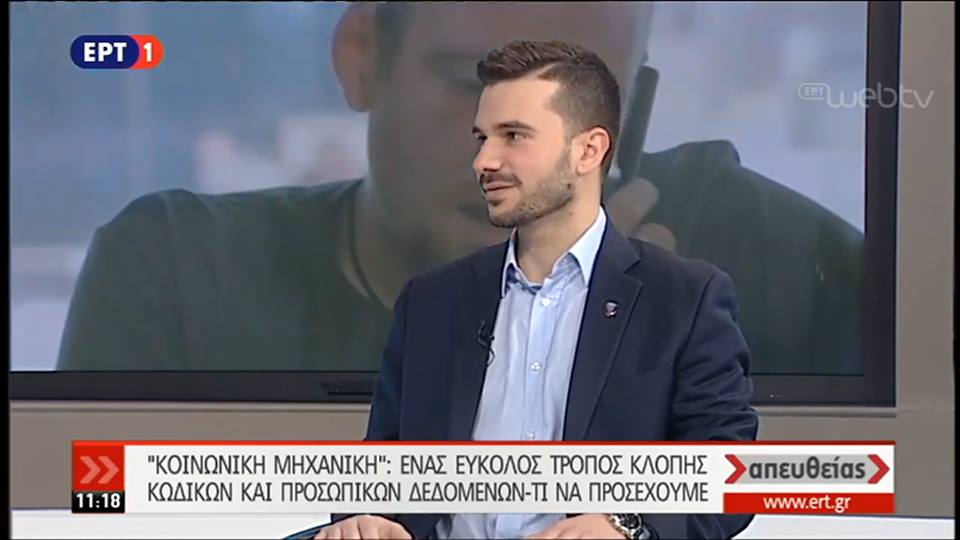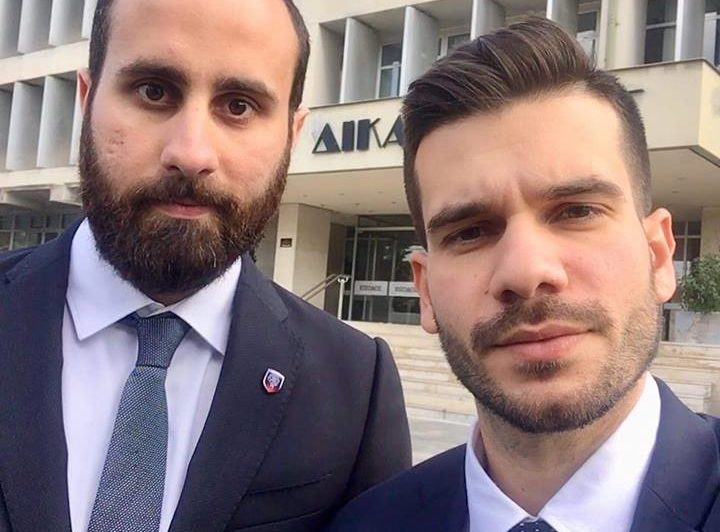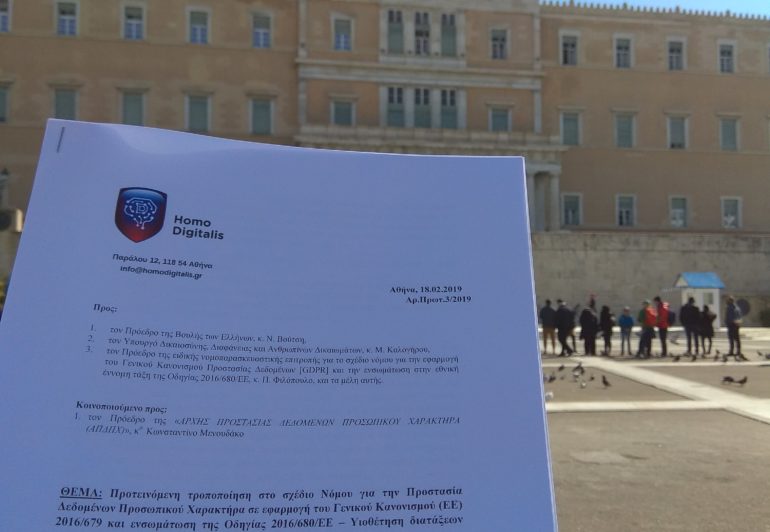Homo Digitalis joins forces with Statewatch, Privacy International, Digital Courage and ApTI
We sent an open letter to call on MEPs in the European Parliament Civil Liberties, Justice and Home Affairs Committee (LIBE) to oppose to the introduction of mandatory fingerprinting for national identity cards.
Mandatory fingerprinting is prescribed in the proposal for a Regulation on strengthening the security of identity cards of Union citizens and of residence documents issued to Union citizens and their family members exercising their right of free movement.
The voting is on 11th March.
Homo Digitalis in Together magazine
Four of the founding members of Homo Digitalis spoke to journalist Elina-Sofia Chasidou about the organization’s activities
Homo Digitalis submits a memorandum on the Personal Data Draft Law
On Tuesday 26 February 2019 Homo Digitalis, as a follow-up to the meeting with the Special Regulatory Committee of the Ministry of Justice, Transparency and Human Rights for the Draft Law on Personal Data, submitted a memorandum containing proposals to the Committee.
Homo Digitalis argued for the adaptation of provisions on the Draft Law for Personal Data, enabling civil society organizations to support citizen’s rights, according to Article 80, paragraph GDPR.
You can read the whole memorandum in Greek here.
Pledge2019.eu: Voters poised to make upload filters a dealbreaker in EU elections
Millions of Europeans are on record rejecting “upload filters” on the internet, which the European Parliament is set to vote on just weeks ahead of the EU elections. Today, Austrian digital rights NGO epicenter.works and partner organisations from across Europe, including Homo Digitalis, are launching the campaign Pledge2019.eu, inviting representatives to pledge to reject upload filters, and voters to reach out with a clear message: We will only vote for politicians who vote against this attack on our freedom of speech.
Pledge2019.eu allows voters from all EU member states to call their representatives free of charge and ask them to pledge to reject Article 13 of the controversial EU Copyright Directive.
“Europeans have made their opposition to upload filters crystal clear in a petition that is closing in on a record-breaking 5 million signatures. However, a malicious rumor circulating in Brussels dismisses these concerned citizens as ‘bots’. That made it necessary to empower voters to speak directly to their representatives, removing all doubt that they are real and that this issue is of real consequence to them”, says Bernhard Hayden, copyright expert at epicenter.works.
“Article 13 threatens the foundations of the free and open internet”, Hayden explains: ”It will leave websites and apps no choice but to install upload filters, effectively censorship machines that must approve anything users wish to post or upload. Levied with the impossible task to prevent any and all copyright infringement before it happens, these filters will inevitably block thousands of legitimate acts of free expression. Diversity online is additionally at risk as small platforms may cave under the onerous obligations and legal uncertainty.”
The final vote in the European Parliament may take place as early as March, with the exact date yet to be announced. The 751 representatives from 28 member states will have the option to reject the entire project or remove the most controversial articles.
“The opposition to Article 13 is not fake, it’s not mere clicktivism, and it’s certainly not in service of any corporate interest – it’s Europeans participating in EU democracy and standing up for their fundamental rights. Seven years ago, citizens successfully defeated the ACTA treaty. This year, they will again make their voices heard”, says Hayden.
Homo Digitalis participates additionally in the #SaveYourInternet campaign.
Watch the campaign's video!
Homo Digitalis at the annual meeting of Digital Freedom Fund
Homo Digitalis had the pleasure and honour to participate at the annual developing strategy meeting, by the organisation Digital Freedom Fund in Berlin. The most prominent civil society organizations at Member State level of the Council of Europe took part in the meeting, focusing their attention on the protection of human rights in the digital era.
Representatives from 48 organisations, including our co-founder Lefteris Chelioudakis, exchanged views and planned future joint actions in sectors, such as the interventionism of national law enforcement authorities through the use of new technologies (face identification systems, algorithmic profiling, video camera applicable to human body), net neutrality and the implementation of the provisions of the General Data Protection Regulation (GDPR).
The meeting lasted two days and our organisation had the opportunity to create new alliances and to share ideas and knowledge with specialists from the sector. Our warm thanks to the organisation Digital Freedom Fund for inviting us to take part. Homo Digitalis is the first Greek organisation invited to this meeting.
Following the two-day meeting, a consultation with the United Nations Special Rapporteur on extreme poverty and human rights Mr. Philip Alston, which Homo Digitalis had also the honour to attend. Discussions on issues concerning the digital services of a welfare state, the negative effects of the automated decisions and the use of algorithms also took place.
Homo Digitalis on the 'Apeftheias' show
Today, February 22, 2019, Stefanos Vitoratos, a founding member of Homo Digitalis, was a guest on the ‘Apeftheias’ show on ERT1, where he spoke about social engineering, the risks it involves, and ways to address it
Homo Digitalis at a meeting with the Special Regulatory Committee for the Draft Law on Data Protection
On 21 February 2019, Homo Digitalis had the honour, upon invitation of the Special Regulatory Committee of the Ministry of Justice, Transparency and Human Rights, to meet with the Committee and to present its views regarding the Draft Law, which incorporates the GDPR and the EU Directive 2016/680.
Our organisation was represented by Konstantinos Kakavoulis and Stefanos Vitoratos, who advocated for the adoption of provisions who would enhance citizens’ protection.
Discussions will continue within the next few days.
Homo Digitalis proposal on the Draft Law on Personal Data
On 18 February 2019, Homo Digitalis submitted a proposal for an amendment to the Draft Law on Personal Data Protection, implementing the General Regulation (EU) 2016/679 and incorporating Directive 2016/680/EU.
Specifically, Homo Digitalis proposed the inclusion on the Draft Law of the provision article 80, paragraph 2 of the GDPR. The provision provides that the described non-profit bodies regardless of any conferment by the data subject, meaning without his command, could:
-have the right to lodge a complaint with the supervisory authority (DPA in Greece)
-have the right to effective judicial redress against a legally binding decision of the supervisory authority (DPA in Greece)
-and have the right to effective judicial remedy against a controller or processor.
We consider that the adoption of the provision of GDPR Article 80, paragraph 2 is particularly important for non-profit bodies in Greece, as Homo Digitalis, to act as enforcement bodies and guards for the strict implementation of the law for personal data and to defend the rights of the data subject. The financial crisis that plagues Greek society in recent years, makes it particularly difficult and unsustainable for citizens to bear the cost for claiming their rights. Therefore, the paramount protection for data subject’s rights from abuses of natural and legal persons will be achieved through the establishment of rules that enable, under the EU legislator’s recommendations, non-profit bodies to act independently and without being subject to the need for relating assignments and mandates.
It is recalled that Homo Digitalis had submitted an open proposal on 20 April 2018, addressed to all Members of the Greek Parliament.
The proposal was notified to the President of the special regulatory Committee for the draft law on the implementation of the General Data Protection Regulation (GDPR) and the incorporation into the national law of Directive 2016/680/EU, Mr. P. Filopoulos, and the members of the committee, to the President of Greek Parliament, Mr. N.Voutsis, and to the Minister of Justice, Transparency and Human Rights, Mr. M.Kalogirou.
We are very optimistic that the proposal of Homo Digitalis will be seriously taken into consideration and the provision of paragraph 80, paragraph 2 will be incorporated in the final draft law.
You can read the proposal of Homo Digitalis in Greek here.
Social Engineering as a threat to Society
Written by Anastasios Arampatzis*
Social Engineering is defined as the psychological manipulation of human behaviour into people performing actions or divulging confidential information. It is a technique, which exploits our cognitive biases and our basic instincts, such as confidence, for the purpose of information gathering, fraud or system access. Social engineering is the “favourite” tool of cyber criminals and is now primarily used through social networking platforms.
Social Engineering in the context of cyber-security
The conduct of the staff has a significant impact on the level of an organisation’s cyber-security, that by extension means that social engineering is a major threat.
The way we train our staff in cyber-security, affects the cuber-security of our organisation, as such. Recognising staff’s cultural background of our company and planning their training in such a way that responds to various cognitive biases can aid to the establishment of an effective information’s security. The ultimate objective should be the development of a cyber-security culture within the meaning of attitude, notion, cognition and behaviour that contribute to protect sensitive and relevant information of an agency. A substantial part of cyber-security culture is the risk awareness of social engineering. If the officials do not consider themselves as part of this effort, then they disregard the security interest of the organisation.
Cognitive exploitation
The various techniques of social engineering are based on specific characteristics of the human decision-making process, which are known as cognitive biases. These biases are derivatives of the brain and the procedure of finding the easiest way possible to process information and take decisions in a swift. For example, a characteristic feature is the representativeness, the trend namely, to group related items or events. Each time we see a car, we do not have to remember the manufacturer or the colour. Our mind sees the object, the shape, the movement and indicates that this is a “car”. Social engineers exploit this characteristic through sending phishing messages. We receive a message with the logo of Amazon and we do not check if it is false or not. Our mind says that this is coming from Amazon, that we trust it and so we click the link and we give away our personal data, as our card number. Similar attacks aim to interception of confidential information for the staff, as i.e. manipulation, fraud by phone. If any person is not adequately trained to face such attacks, he will not even understand their existence.
Principles of Influence
Social engineering is largely based on the six principles of influence, as outlined in the book of Robert Cialdini “Influence: The Psychology of Persuasion” which briefly are:
- Reciprocity: obligation to give when you receive
- Consistency: looking for and asking for commitments that can be made
- Consensus: people will look to the actions of others to determine their own
- Authority: people will follow credible knowledgeable experts
- Liking: people prefer to say yes to those that they like
- Scarcity: people want more of those things there are less of
The scandal of Cambridge Analytica
After the election of the President Trump many media were discussing the possibility that social engineering strategies might have been used to influence public opinion. Revelations for Cambridge Analytica and the data’s use of users of Facebook does not only raise doubts as to data’s privacy and the lack of user’s consensus, but demonstrates the ease with which companies can plan and raise social-engineering campaigns against a whole society.
As for commercial advertisements, it is very important to know your target group, in order to reach your goal with the less possible effort. This is true for every influential campaign and what the scandal of Cambridge Analytica proved is that social engineering is not only a threat to cyber-security of a company or an agency.
Social engineering is a threat to political stability and the free and independent political dialogue. The advertising techniques used in social networking platforms raise many ethical dilemmas. Political manipulation and spreading misinformation and disinformation largely alleviate the existing moral issues.
The threat to Societies
Is it possible for social engineering to trigger a war or social unrest? Is it possible for foreigners to deceive citizens of a state in order to vote against their national interest? If a head of a State (I will not use the word leader) wants to manipulate his/her State’s citizens, can he/she succeed it? The answer to all these questions is yes. Social engineering through digital platforms, which have invaded every social structure is a very serious threat.
The fundamental idea of democracy is that the power is vested in the people and exercised directly by them. Citizens can express their opinions through an open, protected and free dialogue. Accountability, especially of government officials, but also individuals, is equally an important principle of democracy. Through the mass collection and exploitation of personal data with no accountability, these principles are endangered.
However, at this point it should be noted that it is not only social networking platforms to blame, such as Facebook, for any disinformation campaign or political manipulation. These platforms actually reflect our actions. We create our own sterile world, our “cycle of trust”. Therefore, the threat is not the means by themselves, even if they have a share of responsibility in their way of collecting data and advertising practices. The real threat are the devious ones and how they exploit these platforms.
Large-scale campaigns of social engineering, which are taking advantage of human trust, contaminate public dialogue with misinformation and distort reality and can pull societies back from the brink. The truth is doubted more than ever and political polarisation is increased. Spreading news on social media with no accountability leads to political distortion, lack of confidence in the political system and the election of extreme political parties. In brief, social engineering is a serious threat to social and political stability.
Response to the threat
The key to tackling social engineering, considering that tactics are aiming to lack of knowledge, to our unawareness and our prejudices, is awareness. The approach of raising awareness has dual effect: on the one hand we can develop strategies and good practices to confront social engineering as such, on the other hand we can develop policies to reduce the results of social engineering.
In contrast to what is happening in responding to malicious software, in order to address social engineering we cannot just “install” some kind of software to humans in order to stay safe. As Christopher Hadnagy notes in his book “Social Engineering, The Art of Human Hacking”, social engineering requires an holistic, people-focused approach, which will be focused on the following axes:
- Learning to recognise social engineering attacks
- Creation of a personalised program on cyber-security awareness
- Consciousness of the value of information searched by social engineers
- Constantly updated software
- Exercises through a simulation software and “serious” games (gamification)
Confrontation of social engineering should become part of a wider training of our digital security. To combat social engineering on a society level we should be trained for the vulnerability of modern means of communication (i.e. social media), for the reasons, why they can be used for people’s manipulation (i.e personalised advertising, political communication) and for the ways in which they are manipulated (i.e. fake news). Awareness is the key to develop critical thinking against social engineering.
*Anastasios Arampatzis is member of Homo Digitalis, demobilised Officer of Air Force with more than 25 years experience in relevant aspects of security of information. During his time in the Office of Air Force, he was certified NATO evaluator in cyber-security cases and has been honoured for his knowledge and his efficiency. Nowadays, he is a columnist on State of Security of Tripwire firm and for the blog of Venafi. His articles have been published in many well-respected websites.








